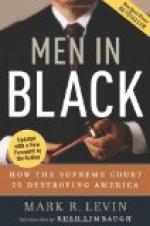The clients become worked up over their wrongs and excited by their lawyers’ oratory. When the case is over they are extremely surprised to see the men who have been shaking their fists and ready to spring at one another’s throats, quietly lock arms and go out to lunch together. It is all in the day’s work and they must fortify themselves for the next trial. The shock is something like that when, after a melodrama, the heroine having jumped over the bridge and died in a whirlpool, comes out quietly and, in spite of her suffering, bows smilingly before the curtain.
The judge and the jury know that the lawyers are coming to life again and are not really trying to kill each other. This is one of the pleasantest aspects of the life in court. There is a good fellowship between the two lawyers who have been so keenly struggling. They even have a kindly feeling toward the judge when he is off the bench.
The court attendant calls the attention of the lawyer to the time, who with a sidelong look at the clock, also “Confidently leaves the case in your hands, gentlemen.”
The two lawyers sit down and the judge puts on his spectacles, gathers up the notes he has been making of the main points of the trial, and turning to the jury begins his charge.
XIV
THE HEAVY CHARGE
No, madam, the charge of the judge does not mean his bill for expenses or his salary for trying the case. A charge implies something grave, heavy, and aggressive. It is what the judge tells the jury about the case. It is never light or humorous, but ponderous and hard to understand. The court-room doors are locked, no one must come in or go out during the charge.
The judge looks solemnly at the jury, the jury straighten up from the desponding attitude they gradually have assumed during the address of counsel.
The end is near and they begin to have hope. They appear interested and a gleam of awakened intelligence is in their eyes. Now at least they are going to hear what they wanted to know about the case. The judge will probably tell them something new and clear up the points they did not understand. It may be even he will explain why he made those strange rulings during the trial and what that mysterious conference was when he called the lawyers to his desk and they talked together for so long.
The judge begins: “Gentlemen of the jury, the plaintiff in this case seeks to recover,” and then he goes on to tell them what the plaintiff wants, which is just what the plaintiff’s lawyer has been telling them. The judge must have been asleep while he was talking for he is saying the same thing over again, only in a little different language. After that the defendant’s case is set forth. There again that is what the defendant’s lawyer was saying. It does not appear reasonable that they are compelled to hear six times what the case is about. There were the two openings of counsel at the beginning, the two summing up at the end, and now the two explanations of the judge. There ought to be an allowance made for the jury possessing a little intelligence.




